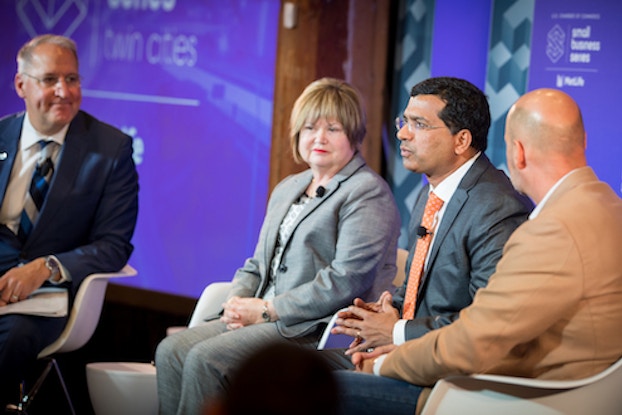
As the Minnesota economy grows, many of the state’s small business owners are planning to heat up their operations, increase their workforces and boost their investments in 2019. More than 250 of the state’s business owners took a powerful step in that direction at the Small Business Series: Twin Cities gathering on May 8, 2019. Participants gained important business skills and insights from some of Minnesota’s outstanding entrepreneurs, and business experts shared their perspectives and insights on tough topics like accessing capital, streamlining operations and maximizing productivity.
We’ve compiled a few key takeaways and highlights from the day’s action.
Join us in DC!
Interested in learning more about running a successful small business? Plan to attend our Summit for small and growing businesses in Washington, D.C. on Oct. 16-17, 2019. We hope to see you there!
Big competition can have big benefits
How does a fledgling business find success while going toe-to-toe with an industry juggernaut? Quite easily, says Fatimah Hussein, who founded a company called ASIYA that manufactures and sells athletic hijabs for Muslim women who play sports. Hussein’s main competitor is Nike, which began selling a line of sports hijabs at roughly the same time Hussein launched ASIYA.
Nike’s move into the sports hijab market turned into a huge advantage for ASIYA, Hussein said. She credits Nike for marketing the new products to potential customers in a massive campaign that Hussein’s startup wouldn’t have been able to replicate. She hopes more large retailers will make their own versions of the product.
“People didn’t even understand what a sport hijab was, so they did all the education for us,” Hussein said. “We’re very excited that Muslim women and girls have options to pick who and what product [they purchase]. We really do hope that more of the other companies take responsibility and bring more sport hijabs out there.”
Reserve one hour daily for important work
Entrepreneurs know what it’s like to be pulled in multiple directions. Many of them face a crushing workload that includes multiple roles within a company, strategic decision making, and administrative tasks that don’t leave much time for important work.
Business owners can maximize their productivity and declutter their schedules by claiming at least one hour daily for their own projects, says Jan Lehman, a productivity coach and chief executive officer of CTC Productivity. That hour should be selected carefully and prioritized over other tasks.
“Every single person deserves one hour each day to do the most important work,” Lehman said. “And we’re not talking about just picking any old hour, because you’ll pick 4:00 o’clock in the afternoon when everybody’s left and the office is quiet. And 80% of you are morning people. So we’re telling you to pick that hour when you’re most ‘on.’”
Lehman recommends that business owners turn off notifications on their computers and phones, because even quick glances at those prompts and banners cost valuable time over the course of the day.
Personal credit scores matter to business lenders
Small and growth-focused businesses across the country cite access to capital as one of the largest challenges they face. U.S. Bank’s Robert Einstein spends his career making loans to small businesses, and he has a simple tip for applicants. He advises that business owners monitor their personal credit scores.
“Make sure you guard your personal credit score because that’s really how banks are going to look at you first, especially when you’re doing smaller credits under $100,000,” Einstein said.
Einstein tells business owners to boost and protect their credit scores by making sound financial decisions and watching closely for potential cases of identity theft.
To improve speed and quality, bring more tasks in-house
In a world shaped by FedEx and Amazon, customers increasingly expect quick turnaround times and lightning-fast delivery from businesses of all sizes. The co-founders of Merchology, an e-commerce company that puts custom logos on high-end branded products from Yeti and Under Armour, have disrupted their industry by doubling down on that high-speed promise. The company has drastically cut down on the industry’s typical 30-day turnaround time, shaving it to a mere handful of days, said Merchology Chief Executive Officer Dick Ward.
By launching their own production facilities in UPS’ major shipping hubs, they’ve maximized their delivery speed while keeping a close eye on quality.
“We can get the product from our brand partners quicker, and we can get it back to the customers faster,” Ward said. “At the end of the day, we’re going to win or lose based on speed because the world is changing, and it’s changing faster and faster.”
Many thanks to our partner, the Minnesota Chamber of Commerce, and our sponsors, MetLife, FedEx, Square, and U.S. Bank.
Full list of Small Business Series: Twin Cities speakers:
- Steve Patterson, host, Twin Cities Live, Emcee
- Fatimah Hussein, founder and CEO, ASIYA
- Jessica Moser, Senior Vice President, Small & Specialty Business, MetLife
- Jan Lehman, CEO, CTC Productivity
- Alissa Henriksen, founder and Co-President, Grey Search + Strategy
- Robert Einstein, SBA Regional Sales Manager, U.S. Bank
- Ally Delgado, Dick Ward, and Andrew Ward, co-founders, Merchology
- Jeanette Mulvey, Executive Content Director, CO—
- Kari Rihm, President and CEO, Rihm Family Companies
- Sirish Samba, President and CEO, Sambatek, Inc.
- Josh Stahl, President, Reviva, Inc.
- Doug Loon, President, Minnesota Chamber of Commerce
- Tom Sullivan, Vice President, Small Business Policy, U.S. Chamber of Commerce
CO—is committed to helping you start, run and grow your small business. Learn more about the benefits of small business membership in the U.S. Chamber of Commerce, here.




